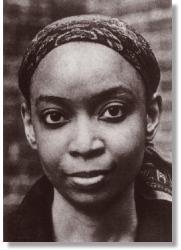 |
|
Chance, Synchronicity
& Mind-writing
Write About A Stranger

I open a tin of Spirit of Scandinavia sardines, floating in mustard sauce. The woman on the bus beside me grunts and leans toward the aisle. She’s a smallish, youngish, short-haired woman, small Gypsy earrings in her ears, looks kinda familiar. I offer her some of them sardines, but she grunts and leans farther toward the aisle. I nibble the sardines with one of those small plastic forks and stare out the window. The sun hitting the window makes a rainbow across a field of straw pyramids. There’s a few horses and cows grazing in the meadow, a whitewashed barn and a farmhouse, one of them three-story farmhouses, and there’s one of them little tin-roofed sheds built onto the farmhouse. It looks like one of them painted scenes, you know the sorta landscape paintings you can buy at them flea markets. Or the sort of landscapes that you see on television, where the different artists teach you how to paint pictures. You can learn how to paint pictures in oil or watercolor, and they teach you the secrets of painting and make it seem like almost anyone can be an artist, at least be able to paint pictures in their style of painting. A Bible’s open in my lap. I’m holding it cater-cornered, trying to keep the sardine oil off the pages, or the mustard sauce. When I finish the tin of sardines, I drink the mustard sauce. The woman beside me grunts again. I glance over at her, at them Gypsy earrings. She’s got smallish, almost perfect-shaped ears, and is little but a full-mouthed woman. Most people likes sardines, or likes the taste of them sardines, but maybe she thinks it’s too countrified to be eating them sardines on the Greyhound bus, even Spirit of Scandinavia sardines. Ever since I seen that movie about the middle passage, though, and they talked about them Africans coming to the New World being packed in them slave ships like sardines in a can, and even showed a drawing of them Africans, that’s supposed to be a famous drawing, so every time I eat sardines I think of that. Of course, I still likes the taste of that, and I don’t think she refuse them sardines on account of that metaphor, though, ‘cause I’m sure there’s plenty of people eats sardines and don’t think of that metaphor. I deposit the tin in a plastic bag that’s already brimming with paper cups, Coke cans, and crumbled paper napkins, then I open a bag of corn tortillas, you know the ones usedta use the bandito to advertise themselves, till the Mexican-American people protested about that bandito, though I remember hearing a song once about a real bandito, not one of those commercialized banditos, but one of those social bandits that the people themselves sing about, like they’re heroes. - Gayl Jones, The Healing
The Green Chair
He wears his sunglasses on his head. He has his hair tied back. He's resting his chin in his left hand while he works his cell phone with his right, scrolling through text messages, absorbed in their content. He's smart, handsome, has no trouble meeting women or getting laid. His sunglasses are Ray-Ban. The book he's reading is Power, Faith and Fantasy: America in the Middle East. His legs are crossed and his sneakers are not inexpensive. He's deep in thought over one of the text messages while his friend across the table is working on his MacBook Air. An iPad is laying on the table, along with another pair of sunglasses and a nearly full bottle of a drink called Upstart Kumbucha. Orange shirt isn't touching his kumbucha though he has finally put down his cell phone and now gives himself a good stretch, arms behind his head and up toward the ceiling. His eyes are closed, he's resting that way, with his arms still back, crossed behind his head. He reminds me of myself when I was his age; maybe he reminds me of myself now - after all, I'm sitting next to him, working on my own MacBook, with my Ray-Bans parked on the table. Orange shirt stands and heads toward the restrooms. His chair is sitting there empty, as if he never sat there, as if I'll never see him again.
Bill Scheffel Boulder, CO 02-June:2015

Gayl Jones
In a 1982 interview, Gayl Jones said that just like most people, she felt "connections to home territory-connections that go into one's ideas of language, personality, landscape" (Rowell 52). Born to Franklin and Lucille Jones on November 23, 1949 in Lexington, Kentucky, Jones' early "connections" with the South are reflected strongly in her personal life as well as in her writing, which often brings Kentucky culture and characters to life for the reader. Much of her desire to write came from her maternal grandmother, Amanda Wilson, who wrote plays for church productions, as well as from her mother, Lucille Jones, who wrote short stories, many of them in order to entertain Gayl and her brother Franklin Jr. Jones says, "I have to say that if my mother hadn't written and read to me when I was growing up I probably wouldn't have even thought about it at all" (Rowell 53). In elementary school, several of Jones' instructors saw through her painfully shy exterior to the talented author blooming within and encouraged her to continue writing.
- Gayl Jones, University of Minnesota interview.
![]()
